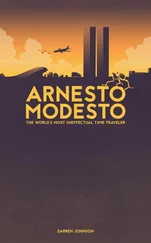James Gleick - Time Travel
Здесь есть возможность читать онлайн «James Gleick - Time Travel» — ознакомительный отрывок электронной книги совершенно бесплатно, а после прочтения отрывка купить полную версию. В некоторых случаях можно слушать аудио, скачать через торрент в формате fb2 и присутствует краткое содержание. Год выпуска: 2016, Издательство: Knopf Doubleday Publishing Group, Жанр: Старинная литература, на английском языке. Описание произведения, (предисловие) а так же отзывы посетителей доступны на портале библиотеки ЛибКат.
- Название:Time Travel
- Автор:
- Издательство:Knopf Doubleday Publishing Group
- Жанр:
- Год:2016
- ISBN:нет данных
- Рейтинг книги:5 / 5. Голосов: 1
-
Избранное:Добавить в избранное
- Отзывы:
-
Ваша оценка:
- 100
- 1
- 2
- 3
- 4
- 5
Time Travel: краткое содержание, описание и аннотация
Предлагаем к чтению аннотацию, описание, краткое содержание или предисловие (зависит от того, что написал сам автор книги «Time Travel»). Если вы не нашли необходимую информацию о книге — напишите в комментариях, мы постараемся отыскать её.
Time Travel — читать онлайн ознакомительный отрывок
Ниже представлен текст книги, разбитый по страницам. Система сохранения места последней прочитанной страницы, позволяет с удобством читать онлайн бесплатно книгу «Time Travel», без необходимости каждый раз заново искать на чём Вы остановились. Поставьте закладку, и сможете в любой момент перейти на страницу, на которой закончили чтение.
Интервал:
Закладка:
Now he has departed from this strange world a little ahead of me. That means nothing. People like us, who believe in physics, know that the distinction between past, present, and future is only a stubbornly persistent illusion.
Einstein died three weeks later.
—
FUNNY IRONY, though.
A century after Einstein discovered that perfect simultaneity is a chimera, the technology of our interconnected world relies on simultaneity as never before. When telephone-network switches get out of sync, they drop calls. While no physicist “believes in” absolute time, humanity has established a collective official timescale, preached by a choir of atomic clocks maintained at a temperature near absolute zero in vaults at the United States Naval Observatory in Washington, the Bureau International des Poids et Mesures near Paris, and elsewhere. They bounce their networked light-speed signals to one another, make the necessary relativistic corrections, and thus the world sets its myriad clocks. Confusion about past and future cannot be tolerated.
To Newton this would make perfect sense. International atomic time has the effect of codifying the absolute time that he created, and for the same reason: it lets the equations work out and the trains run on time. A century before Einstein, this technical achievement in simultaneity would have been almost impossible to conceive. The very notion of simultaneity scarcely existed. It was a rare philosopher who considered the question of what time it might be in a faraway place. One could hardly even hope to know, said the doctor and philosopher Thomas Browne in 1646,
It being no ordinary or Almanack business, but a probleme Mathematical, to finde out the difference of hours in different places; nor do the wisest exactly satisfy themselves in all. For the hours of several places anticipate each other, according to their Longitudes; which are not exactly discovered of every place.
All time was local. “Standard time” had no use before the railroad came and could not be established before the telegraph. England began synchronizing its clocks (new expression) to railway time in the mid-nineteenth century, when telegraph signals went out from the new electromagnetic clock at the Royal Observatory in Greenwich and the Electric Time Company in London. Also to the newly coordinated clock towers and electric street clocks of Bern. *6These were technologies on which the ideas of Einstein depended, and also the ideas of H. G. Wells.
So now, on a hilltop near the Potomac River, the United States maintains a Directorate of Time, a subdepartment of the navy and by law the country’s official timekeeper. Likewise in Paris is the BIPM, which also owns the international prototype of the kilogram. These are the keepers of temps universel coordonné, or coordinated universal time, or UTC—which I think we can admit is arrogantly named. Let’s just call it Earth time.
All the chronometric paraphernalia of modernity: scientific, and yet arbitrary. Railroads made time zones inevitable, and in hindsight we can see that time zones already entailed a sense of time travel. They were not organized all at once, by fiat. They had many beginnings. For example, on November 18, 1883, a Sunday, known afterward as “the Day of Two Noons,” James Hamblet, general superintendent of the Time Telegraph Company in New York City, reached out his hand and stopped the pendulum of the standard clock in the Western Union Telegraph Building. He waited for a signal and then restarted it. “His clock is adjusted to hundredth parts of a second,” reported the New York Times, “a space of time so infinitesimal as to be almost beyond human perception.” Around the city, tickers announced the new time and jewelers’ shops adjusted their clocks. The newspaper explained the new setup in science-fictional terms:
When the reader of The Times consults his paper at 8 o’clock this morning at his breakfast table it will be 9 o’clock in St. John, New-Brunswick, 7 o’clock in Chicago, or rather in St. Louis—for Chicago authorities have refused to adopt the standard time, perhaps because the Chicago meridian was not selected as the one on which all time must be based—6 o’clock in Denver, Col., and 5 o’clock in San Francisco. That is the whole story in a nut-shell.
Of course, that was nothing like the whole story. Arbitrary as they were, the railroads’ time zones did not please everyone, and a new oddity followed: Daylight Saving Time, as it was known in North America, or, as Europeans called it, Summer Time. Even now, after a century of experience, some people find this twice-yearly time jump disturbing, and even physically uncomfortable. (And philosophically unsettling. Where does the hour go?) Germany was the first to impose Sommerzeit, during World War I, hoping to save coal. Soon after, the United States adopted it, then repealed it, then reimposed it. In England, seeking evening light for hunting, King Edward VII had the clocks on the royal estate set to “Sandringham Time,” a half hour ahead of Greenwich. When the Nazis occupied France, they ordered all the clocks moved an hour forward, to Berlin time.
It was not just a matter of minutes and hours. The days and the years, too, confounded a world whose farthest parts were now in close communication. When, finally, would humanity agree on a uniform calendar? The new League of Nations took up the question after World War I. Its Committee on Intellectual Cooperation chose the philosopher Bergson as its president; another member, briefly, was Einstein. The League tried to impose the Gregorian calendar, itself the product of centuries of strife and revision, on nations less concerned with computing the proper dates of Easter feasts. The prospect of leaping forward or back in time created anxiety. Those nations did not fall in line. Bulgarians and Russians complained that their citizens could not be made suddenly to age by thirteen days, to surrender thirteen days of their lives in the name of globalization. Conversely, when France condescended to join Greenwich time, the Parisian astronomer Charles Nordmann said, “Some people may have consoled themselves with the reflection that to grow younger by 9 minutes and 21 seconds, on the authority of the law, was a pleasure worth having.”
Had time become a thing over which dictators and kings could exercise power? “The Problem of Summer Time” is the English title of a new sort of time-travel story, published in 1943 by a darkly satirical Parisian writer, Marcel Aymé. In French it is “Le décret” —The Decree—issued after scientists and philosophers discover how easy it is to advance the time an hour forward each summer and back again each winter. “Little by little,” says the narrator, “the realization spread that time was under man’s control.” Humans are time’s dynamic masters: they may hurry up or slow down to suit themselves. Anyway “the old, stately pace was over.”
There was much talk of relative time, physiological time, subjective time and even compressible time. It became obvious that the notion of time, as our ancestors had transmitted it down the millennia, was in fact absurd claptrap.
With time now seemingly at their command, the authorities see a way to escape the nightmare of a war that seemed endless. They decide to advance the years by seventeen: 1942 leaps forward to 1959. (In the same spirit, moviemakers in Hollywood began to tear pages from calendars and spin the hands of clocks so as to move time along for their viewers.) The decree makes the world and all its people seventeen years older. The war has come to an end. Some have died, others have been born, and everyone has some catching up to do. It’s all rather disorienting.
Aymé’s narrator travels from Paris by railroad into the countryside. A surprise awaits him there. Apparently the decree has not spread everywhere. A storm, some wine, a troubled sleep, and in a distant village he encounters active German soldiers, and, sure enough, the mirror now shows him the thirty-nine-year-old he was, not the fifty-six-year-old he had become. On the other hand, he still has his newly acquired memories of those seventeen years. This is disturbing—indeed, impossible. “To be from an era, I thought, is to behold the world and oneself in a certain way that belongs to that era.” Is he fated to relive the same life, burdened with memories of times to come?
Читать дальшеИнтервал:
Закладка:
Похожие книги на «Time Travel»
Представляем Вашему вниманию похожие книги на «Time Travel» списком для выбора. Мы отобрали схожую по названию и смыслу литературу в надежде предоставить читателям больше вариантов отыскать новые, интересные, ещё непрочитанные произведения.
Обсуждение, отзывы о книге «Time Travel» и просто собственные мнения читателей. Оставьте ваши комментарии, напишите, что Вы думаете о произведении, его смысле или главных героях. Укажите что конкретно понравилось, а что нет, и почему Вы так считаете.












